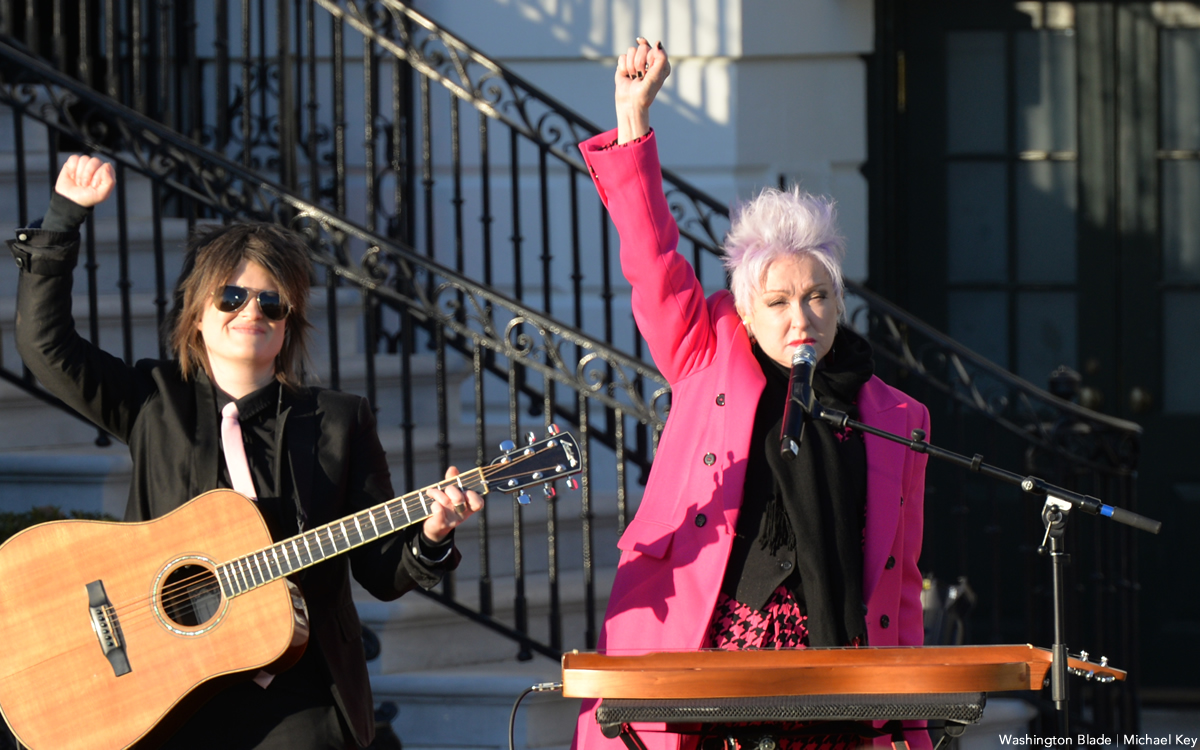Music & Concerts
Sister act
Martha Wainwright on family, music and new show with brother Rufus
It could be the royal family of folk-pop, artsy-confessional music.
The Wainwright musical dynasty began with their troubled father, folk singer-songwriter and actor Loudon Wainwright III and their mother, the late Canadian folksinger Kate McGarrigle.
In this generation it has flowered into cult stardom both with gay singer and opera composer Rufus Wainwright and his younger singer-songwriter sister Martha, who are together in concert this Saturday Aug. 7 at The Music Center at Strathmore in Bethesda.
Of the Wainwright clan, the Guardian newspaper of London recently observed that, “Loudon, Kate, Martha and Rufus are the bards of kith and kin, the troubadours of the consanguine,” a fancy way of saying they write about family and use song to communicate with the ones they love — or in Martha’s case at least feel greatly troubled about, as in her notorious song that she admits was written to her father: the quite literally titled “Bloody Mother Fucking Asshole.”
But she has also sung a duet, in his 1995 album “Grown Man,” with her father Loudon. Titled “Father/Daughter Dialogue,” in it she lays bare in song her deeply felt family grievance as she sings to him, “Dearest Daddy with your songs/ Do you hope to right your wrongs?/ You can’t undo what’s been done/ To all your daughters and your son.”
In an exclusive interview with the Blade, as she was driving to Boston with her aunt Teddy to her concert appearance there Tuesday night with Rufus, Martha said that some of her songs in the Strathmore concert on Saturday will be from her first songs that were “more about my family,” as in her 2005 self-titled debut album “Martha Wainwright.”
But in addition to “some old hits from my first album,” her set will also include a mix of her more recent songs, such as those from her second album, “I Know You’re Married But I’ve Got Feelings Too,” which are less about her family, she says, and “more so about others.” She was married in 2007 to her producer Brad Albetta.
“I have the tendency to write about people I know and love,” she admits, “and family is in that group still.”
Rufus, meanwhile, is also a troubadour of troubled family life. His troubles include the pain of their parents’ divorce when he was three and also his mother’s recent death from cancer, as well as his own personal odyssey coming out as gay while a teenager. In 1999, he told Rolling Stone that his father recognized his same-sex attraction early and has also admitted that his “mother and father could not even handle me being gay,” and it was basically off limits for discussion.
At 14, Rufus was sexually assaulted in London’s Hyde Park after picking up a man in a bar. In an interview years later, he described the event that left him fearing that he would become HIV-positive after the brutal rape in which the assailant also tried to strangle him to death.
“I thought it was going to be a romantic walk in the park, but he raped me,” and he says he survived through quick wits only by pretending to be an epileptic and faking a seizure.
He says he remained celibate for seven years after the rape but then turned promiscuous. Later, in the early 2000s, he became addicted to crystal meth and even temporarily lost his vision. The addiction reached a crescendo in 2002 during a week he has described as “the most surreal of my life,” including time spent partying with President George W. Bush’s daughter Barbara and a “debauched” evening with singer Marianne Faithfull. He has said he experienced recurring hallucinations of his father throughout.
From hitting bottom then, Rufus has said he decided he would either go into rehab or instead go to live with his father because “I knew I needed an asshole to yell at me, and I felt he fit the bill.” These and other tales of trial and tribulation are recounted in Kirk Lake’s 2009 unofficial biography, “There Will Be Rainbows: A Biography of Rufus Wainwright and the Story of Loudon Wainwright and Kate McGarrigle.”
Born in 1973, his parents divorced in 1976 and Rufus lived with his mother Kate in Montreal, Canada for most of his precocious youth. He began playing piano at age six and at 13 started touring with “The McGarrigle Sisters” — Kate and her sister Anna. At age 14, he performed his song “I’m a Runnin'” in a film. He then attended high school at the Millbrook School in New York, which would later inspire his song “Millbrook.”
After briefly studying piano at universities in Montreal, he began to perform at weekly shows at Cafe Sarajevo there and soon was on the Montreal club circuit and cutting demo tapes. He showed such talent and so impressed his father that he sent the tapes to legendary songwriter and producer Van Dyke Parks, who passed them on to DreamWorks, the record label co-owned by David Geffen, which signed Rufus and released his first studio album, the eponymous “Rufus Wainwright” in 1998.
The singer had moved to New York City in 1996 but relocated later that year to Los Angeles where he spent most of two years in the studio working on that first album in sessions costing a reported $700,000. Rolling Stone called it one of the best albums of 1998 and named Rufus “Best New Artist” of the year. He was also nominated for four awards by the Gay and Lesbian American Music Awards and again won for “Best New Artist,” as well winning the GLAAD Media Award for outstanding music album. Commercial success for the album was, however, limited.
Rufus toured with Sean Lennon, son of John Lennon and Yoko Ono, in 1998 and began his own first headline tour later that year. He lived in New York City’s shabby but chic Chelsea Hotel for six months during which he wrote most of his second album “Poses,” which was also released to critical acclaim, winning another GLAAD Media Award, but again finding limited sales. From 2001 to 2004, he toured with Tori Amos and Sting, meanwhile releasing more albums and in 2005 a DVD titled “All I Want,” featuring a biographical documentary and music videos, and that same year he contributed a solo song to Burt Bacharach’s “At This Time.”
In 2006 in two sold-out concerts at Carnegie Hall in New York City, he performed an entire Judy Garland set of songs based on her album she recorded there in 1961. He later repeated this concert at the Hollywood Bowl, the Paris Olympia, and at London’s Palladium, and live CD and DVD recordings of these concerts — “Rufus Does Judy” — were released in 2007. Also that year, Geffen Records released Wainwright’s fifth studio album, “Release the Stars,” produced by the singer and featuring among others his mother and sister.
His more recent interests have also turned to opera – and his first opera, originally commissioned by the Metropolitan Opera in New York City, “Prima Donna,” the libretto written in French, is about “a day in the life of an opera singer,” anxiously preparing for her comeback, who falls in love with a journalist.
In 2010, he released his sixth studio album, “All Days Are Nights: Songs for Lulu,” mainly featuring his piano and vocals with nine original songs rather than the lush instrumentation and arrangements of his other work. This new CD, for which he is now on tour, includes the closing aria from his debut opera, “Les feux d’artifice t’appellent” (or the games of fancy call to me).
The CD also features three of William Shakespeare’s sonnets set to music, including Sonnet 43 giving the album its title, “All days are night to see till I see thee….”
The “thee” is possibly a reference to his boyfriend and partner of five years, German arts administrator Jorn Weisbrodt, about whom the singer declared in a recent London Telegraph interview that, “I wasn’t a huge gay marriage fan before I met Jorn because I love the whole old-school promiscuous Oscar Wilde freak show of what ‘being gay’ once was. But since meeting Jorn all that has changed.”
Also included in the album is a striking opening track, “Who Are You New York?” with its rolling arpeggios that recount an “obsessive search for an unnamed object of desire,” the haunting obsession of erotic fantasy, a song originally written for a film project, but rejected by its producers to Wainwright’s evident relief. His powerful third track, the song “Martha,” meanwhile, consists of conversational lyrics.
“Martha, it’s your brother calling/ Time to go up north and see mother/Things are harder for her now/ And neither of us is really that much older than each other any more./ Martha, it’s your brother calling/ Have you any chance to see father/Wondering how he’s doing/And there’s not much time/ For us really to be that angry at each other anymore.”
Family. The ties that bind, the ties that can also choke. Family, the seedbed of the Wainwright musical canon. Come hear brother and sister give their musical voices to this pain and this passion.
Rufus Wainwright
w/ Martha Wainwright
Aug. 7, 7:30 p.m.
Music Center at Strathmore
Bethesda, Md.
$46, 202-397-SEAT
ticketmaster.com
Music & Concerts
Washington chorale kicks off Christmas with vibrant program
‘Thine Own Sweet Light’ concerts planned

The full Washington Master Chorale will return for its annual holiday concert tradition with “Thine Own Sweet Light” on Friday, Dec. 19 and Sunday, Dec. 21 at St. Ann’s Catholic Church (D.C.) and Church of the Epiphany (D.C.).
The concert will feature the rich sounds of the 50-voice, a cappella chorus performing lush, seasonal choral music inspired by the theme of light. Highlights include Edvard Grieg’s “Ave Maris Stella,” Eric Whitacre’s “Lux Aurumque,” and Christopher Hoh’s “Holy, Holy, Holy is the Lord God of Hosts.” The program will also present a new work by Barcelona composer Josep Ollé i Sabaté, along with charming holiday folk songs and seasonal favorites.
For more details, visit the Washington Master Chorale website.
Music & Concerts
Queer mega stars (and allies) ready to take D.C. stages this fall
Watch LGBTQ icons light up stages across the DMV as they sing, dance, and drag their way through spectacular shows.

One of the best ways to welcome fall is by catching LGBTQ performers (and their allies) lighting up some of the D.C. area’s biggest stages. From country and pop to drag and rock, the season is packed with shows you won’t want to miss.
Maren Morris – The country, rock, and pop diva—known for hits like “The Bones” and for standing up against Nashville’s anti-LGBTQ voices—takes the stage at Wolf Trap (1551 Trap Rd, Vienna, Va.) on Friday, Sept. 12 at 8 p.m. Tickets start at $64.
RuPaul – The mother of modern drag and host of “RuPaul’s Drag Race” will spin a DJ set at Echostage (2135 Queens Chapel Rd NE) in Northeast D.C. on Sept. 20. Before RuPaul swaps wigs for headphones, Trade and Number 9 owner Ed Bailey will warm up the decks. For tickets and details visit echostage.com.
Conan Gray – The queer pop prince, celebrated for his Gen Z anthems like “Heather” and “Maniac,” brings his Wishbone Pajama Show to EagleBank Arena in Fairfax, VA, (4500 Patriot Cir) on Sept. 20 at 8 p.m. Tickets start at $113. For more info visit shop.conangray.com/pages/tour.
All Things Go Music Festival – With a lineup that includes Noah Kahan, Lucy Dacus, Kesha, Clairo, Doechii, and more, the beloved LGBTQ-friendly festival takes over Merriweather Post Pavilion (10475 Little Patuxent Pkwy, Columbia, Md.) Sept. 26–28. For tickets and details visit allthingsgofestival.com.
BERTHA: Grateful Drag – This unique tribute brings drag artistry and the sounds of the Grateful Dead to The Atlantis (2047 9th St NW) on Sept. 27. Tickets start at $47 at theatlantis.com.
Peach PRC – Rising Australian pop star and out lesbian, whose confessional tracks like “Perfect for You” and “Forever Drunk” have made her a queer TikTok darling, performs at The Atlantis on Sept. 29 at 6:30 p.m. The show is general admission only. Additional details are on theatlantis.com.
Addison Rae – The TikTok star-turned-pop princess, who’s crossed over into music with glossy hits like “Diet Pepsi” brings her sold out show to The Anthem (901 Wharf St., S.W.) on Sept. 30. Tickets are sold out, but resale options start around $80. For more info visit theanthemdc.com.
The Rocky Horror Picture Show 50th Anniversary – Celebrate the cult classic that’s been a queer midnight-movie staple for decades, with Barry Bostwick (a.k.a. Brad Majors) at the Warner Theatre (513 13th St., N.W.) on Oct. 2 at 8 p.m. Tickets start at $41 via Ticketmaster.
Chaka Khan, Patti LaBelle, Gladys Knight & Stephanie Mills – Four legends, one stage. Between Khan’s funk, LaBelle’s soul, Knight’s R&B, and Mills’ powerhouse vocals, this concert at Capital One Arena (601 F St NW) on Oct. 3 at 8 p.m. promises pure diva magic. Tickets start at $103. For more details visit capitalonearena.com.
Lorde – Joined by The Japanese House and Chanel Beads, the Grammy-winning New Zealand singer-songwriter behind “Royals” and “Solar Power” returns to The Anthem on Oct. 4 at 7 p.m. Lorde has long been embraced by queer fans for her dreamy pop and subversive lyrics. For more info visit theanthemdc.com.
Andy Bell (of Erasure) – The British queer rock icon, best known for synth-pop classics like “A Little Respect” and “Chains of Love,” brings his Ten Crowns Tour to the Lincoln Theatre (1215 U St., N.W.) on Friday, Oct. 17 at 8 p.m. Tickets are $90.45.
Doechii – The self-described queer “Swamp Princess”—and WorldPride 2025 headliner—continues her breakout year with the Live from the Swamp Tour at The Anthem on Oct. 21 at 8 p.m. Known for blending rap, R&B, and avant-garde performance art, Doechii is one to watch. Tickets start at $153.
Neon Trees – The out-and-proud Utah rockers behind “Everybody Talks” and “Animal” perform at the Lincoln Theatre on Friday, Oct. 24 at 8 p.m. Lead singer Tyler Glenn, who came out publicly in 2014, has become a strong queer voice in alternative rock. For tickets and info visit impconcerts.com.
Sasha Colby – The “RuPaul’s Drag Race” Season 15 winner strips down on the Stripped II Tour at the Warner Theatre on Nov. 2 at 8 p.m. Tickets available now on Ticketmaster.
Lola Young – The bisexual indie-pop sensation, whose raw songwriting has earned her millions of TikTok fans and multiple chart soaring hits visits The Anthem on Nov. 9 at 8 p.m. Tickets are still available.
Opera Lafayette
Featuring Mary Elizabeth Williams as Dido
+ Elijah McCormack, Chelsea Helm
Oct. 16, 7:30 p.m.
Sixth & I
PostClassical Ensemble
The Pale Blue Do: A Musical Voyage Inspired By Nature
Featuring National Geographic’s Enric Sala, Guest Curator
Wednesday, November 19, 7:30 p.m.
Terrace Theater
Washington Concert Opera
Starring Kate Lindsey, Theo Hoffman, John Moore, and Fran Daniel Laucerica
Nov. 23, 6 p.m.
Lisner Auditorium
Washington Master Chorale
An intimate a capella concert taking place in an architectural jewel, featuring cherished choral gems from Anglican and Catholic tradition and early American hymns. The concert will also present the world premiere of Christopher Hoh’s Holy, Holy, Holy is the Lord God of Hosts, and hymn singing featuring Robert Church, organist and choirmaster at St David’s.
Oct. 18, 7:30 p.m.
October 19, 5 p.m.
St. David’s Episcopal Church
Music & Concerts
Cyndi Lauper ready to have fun in Virginia
Superstar to bring final leg of farewell tour to Jiffy Lube Live

Superstar Cyndi Lauper will bring the final leg of her farewell tour “Girls Just Wanna Have Fun” to Bristow, Va., on Thursday, July 24 at Jiffy Lube Live.
Lauper’s international Farewell Tour – her first major headlining run in a decade – kicked off in North America last October, and included her first time ever headlining (and selling out) Madison Square Garden. Lauper’s performances have earned raves from the New York Times, Rolling Stone, Billboard, and many more, and surprise guests have included Chaka Khan, Sam Smith, and Hayley Williams. The tour just visited the U.K. and Europe, and will head to Australia and Japan in April.
Tickets are available on Live Nation’s website.
-

 India5 days ago
India5 days agoActivists push for better counting of transgender Indians in 2026 Census
-

 Advice5 days ago
Advice5 days agoDry January has isolated me from my friends
-

 National5 days ago
National5 days agoAfter layoffs at Advocate, parent company acquires ‘Them’ from Conde Nast
-

 District of Columbia5 days ago
District of Columbia5 days agoCapital Pride reveals 2026 theme














